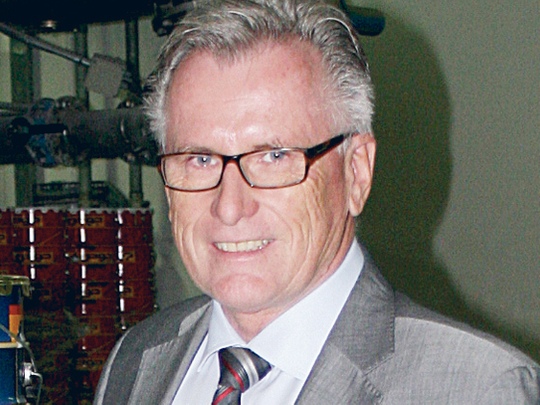
Dubai: One of the world's largest suppliers and producers of paint, Jotun Paints reported its best business year in the Middle East region in 2009 despite the slowdown in some of the company's key markets such as the construction and industrial equipment sectors.
Gulf News asked Erik Aaberg, group executive vice-president for Jotun Paints, if the paint business was different from others.
Gulf News: Jotun Paints has a strong foothold in the Middle East and is catering to a very large range of customers. Does this mean the business is somehow safe owing to its broad base?
Erik Aaberg: First of all we have a long tradition in the Gulf. Our first factory was launched in 1975 to supply Dubai Drydocks with ship paint. Since then, we continuously expanded in the region in the industrial and decorative sector.
Today, we are having a strong network in the decorative paints market, in marine coating as well as in protective and powder coating with a wide-ranging dealership.
Currently, we are present in the UAE, Saudi Arabia, Oman, Egypt, Qatar, Bahrain, Kuwait, Yemen, Turkey, Sudan, Iran and Libya with eight factories; a ninth will be built in Libya.
The UAE, however, currently is still our biggest market in volume even as the region might have experienced a slowdown.
What is the reason for the ongoing solid business?
Paints are a late cycle business, meaning that we are still supplying large projects which otherwise are already finished. Among the bigger projects, the order from the Dubai Metro is the biggest ever in the region for Jotun, and this will continue with the second phase, the Green Line.
Also the marine paint sector is doing well. For the Metro, we used acrylic paint, bridge protection coating and fireproof paint. It was an order of around Dh100 million.
Another huge project was the Burj Khalifa, for which we delivered interior paint, wall painting and protectives.
Other orders came from Meydan, Palm Jumeirah, Arabian Ranches or Masdar City, where we are applying special paints for heat protection.
Our decorative projects comprise the expansion of Dubai International Airport, 350 buildings in Remraam, Mina Al Arab in Ras Al Khaimah and projects in Ajman.
But what follows after the big jobs are done?
It is right to assume that the impact of the slower business environment will follow later, of course. There is no compensation for a big project such as the Dubai Metro. But we have not seen any orders being cancelled so far.
However, there was [a] slowdown in the decorative paints segment of minus 12 per cent compared to May or June 2009.
In Dubai, there are currently very few new projects coming in, we expect the next two to three business years to be quite slow compared to what we haven seen in the years before.
Does this apply to all Middle East markets?
No, the partial slowdown in the Dubai is compensated by our activities in Abu Dhabi as well as in Qatar and Saudi Arabia, where a lot of projects are on the way.
Our regional sales grew 8 per cent in 2009, and we expect a sales growth between 5-8 per cent in 2010. Furthermore, the marine business and the coating segment for the oil and gas industry are stable.
In Dubai, I think... liquidity is the issue to keep the market running. But this also applies to the Western world.
Where are Jotun's new areas of expansion?
The Middle East is still a growth region. As I said, there are huge projects in Saudi Arabia under way, in Oman our growth was ten per cent last year, Qatar's upswing will continue, Egypt is very promising, and we look very closely at Iran, Syria and Jordan.
We won't reach growth rates of 20-25 per cent as we did two years ago, but we will still reach 5-10 per cent. On the other hand, there is an extremely strong growth in Indonesia, Malaysia, Thailand and Vietnam, in China, India and Korea.
Malaysia was recently named Jotun's new manufacturing hub in Southeast Asia. We are closing our factory in Singapore and opening a bigger one near Kuala Lumpur.
What is Jotun's market share in the Middle East?
We [hold] an average 25 per cent market share in the region. Of course, this differs from country to country. In the UAE, [Sharjah-based] National Paints is our biggest competitor.
How big is the workforce?
We employ 1,600 people in the region, 1,004 of them work in the paints segment. We added 100 [new employees] last year, and 120 new staff will join us this year in Saudi Arabia and Abu Dhabi.
In Dubai, we have no plans to increase the workforce at the moment.
To which extent is Jotun purchasing raw or base material for its paints in the region?
We look to buy raw material in the region, for example emulsions or titanium dioxide in large volume.
Other materials, like special additives... are coming from Europe. The supplier interest in the paints market is increasing, as many underestimate it.
How are the other markets doing, apart from the Middle East and Asia?
We are not satisfied in Eur-ope. It has indeed been affected by the financial crisis.
However, our largest market remains Norway, and we are traditionally well-known in Scandinavia.
Profile
Jotun, based in Sandefjord, Norway, is one of the world's largest producer of paints and coatings.
Currently, the group has 71 companies and 40 production facilities on all continents.
The company's operations cover development, production, marketing and sales of various paint systems and products to protect and decorate surfaces in the residential, shipping and industrial markets.
In 2009, Jotun's operating revenue went up by 7.4 per cent to 11.22 billion crowns (Dh6.9 billion), while operating profit surged by 25.9 per cent to 1.16 billion crowns.











